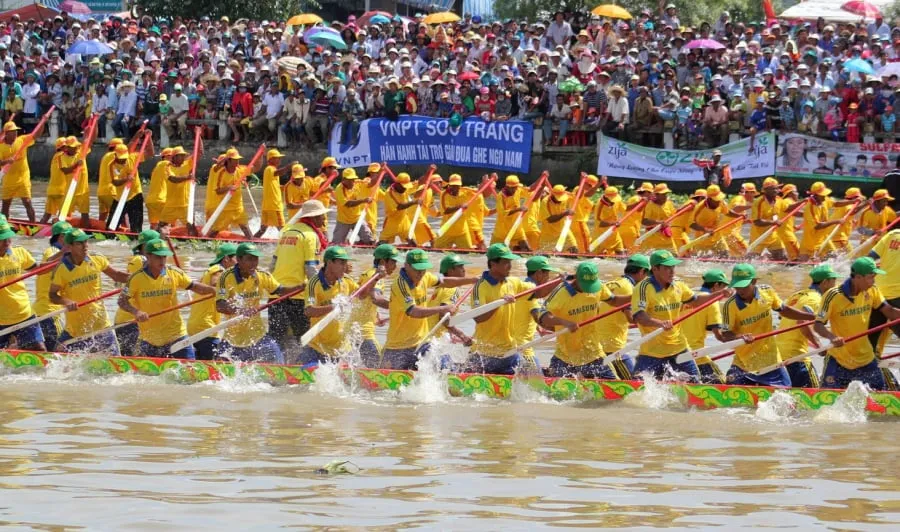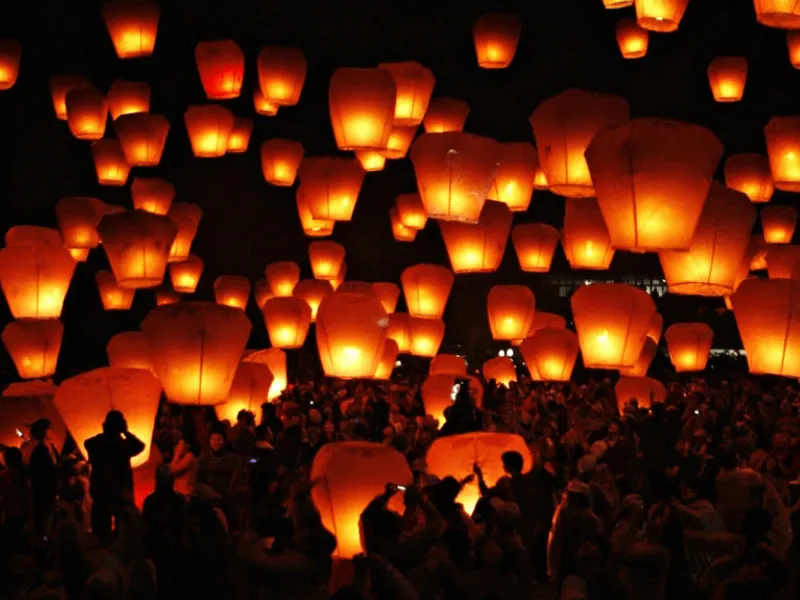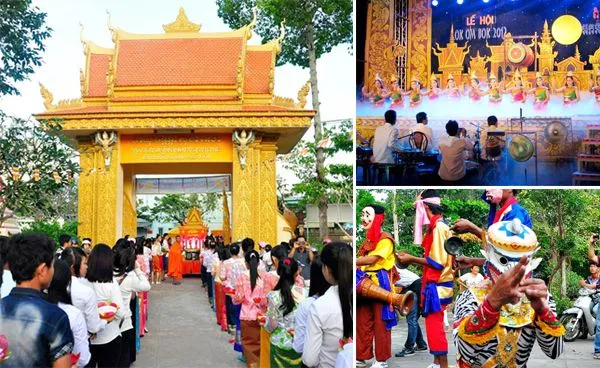Ok Om Bok: The Soul of Khmer Culture Under the Magical Moonlight
The Ok Om Bok Festival, one of the most important festivals of the Khmer people in the Southern Delta, takes place on the full moon night of the 10th lunar month every year. This is not only an occasion to thank the Moon God and the Water God for a bountiful harvest, but also a time for the Khmer community to gather, strengthen family bonds, and preserve the beauty of traditional culture. Under the magical full moon, Ok Om Bok appears as a vibrant picture, full of colors and sounds, attracting thousands of people and tourists.
Images of Ok Om Bok: A Splendid Cultural Tapestry
The images of Ok Om Bok always leave a strong impression on visitors with the diversity and brilliance of cultural colors. From the splendid traditional costumes of Khmer girls, the graceful and rhythmic dances, to the solemn moon worshiping ceremonies, all create a lively and bustling festival atmosphere. In particular, the image of Ngo boats full of agricultural products floating leisurely on the shimmering river under the moonlight further enhances the magical beauty of the festival.
Ngo Boats and Their Deep Spiritual Meaning
Ngo boats are an indispensable part of the Ok Om Bok Festival. Releasing Ngo boats onto the river is not only a ritual to thank the Water God, but also carries the meaning of praying for a bountiful harvest and a prosperous and happy life. The image of Ngo boats shimmering with lights, drifting along the water, carrying the wishes of the Khmer people, creates a scene that is both sacred and romantic.
Ok Om Bok Full Moon Festival: The Beauty of Folk Beliefs

The Ok Om Bok Full Moon Festival is an occasion for the Khmer people to express their reverence for the Moon God and the Water God, praying for favorable weather and a good harvest. The moon worshiping rituals are performed solemnly, with full traditional offerings such as sticky rice cakes, fruits, and fresh flowers. Besides, the festival is also an opportunity for the Khmer community to gather, exchange, share production experiences, and preserve their ethnic cultural identity.
Traditional Music and Dance
Music and dance are indispensable elements of the Ok Om Bok Festival. The vibrant melodies and graceful dances of Khmer artists create a lively and bustling festival atmosphere. The sounds of drums and trumpets resonate, blending with the laughter of the people, creating a vibrant symphony, reflecting the unique cultural beauty of the Khmer people.
Experiencing Ok Om Bok: A Journey to Discover Unique Culture
Participating in the Ok Om Bok Festival, visitors not only admire the beautiful images but also have the opportunity to experience the unique cultural activities of the Khmer people. From participating in moon worshiping ceremonies, releasing Ngo boats, to enjoying specialties, and shopping for handicrafts, all bring visitors interesting and unforgettable experiences.
You may need or be interested in
- Top 5 virtual living destinations for Mid-Autumn Festival that young people cannot ignore
- Untold stories of the Gau Tao festival: A spiritual ritual that causes a stir!
- A Weeklong Expedition Through the Wonders of Ninh Binh
- Discover the cultural beauty through the Long Tong festival of the Tay people in Ha Giang
Ok Om Bok Cuisine: Typical Flavors of the River Region
Cuisine is an indispensable part of the Ok Om Bok Festival. Visitors have the opportunity to enjoy Khmer specialties, such as pancakes, noodle soup, sour fish soup, etc. These dishes are not only delicious but also carry the typical flavor of the Southern Delta river region.
Khmer Pancakes: A Must-Try Dish

Khmer pancakes are a favorite dish of many tourists. With a crispy crust, diverse fillings, combined with sweet and sour dipping sauce, Khmer pancakes offer an irresistible flavor.
Preserving and Promoting the Cultural Value of Ok Om Bok
The Ok Om Bok Festival is a precious cultural heritage of the Khmer people. Preserving and promoting the value of this festival not only contributes to preserving the national cultural identity but also creates tourism attraction, contributing to local economic development. There should be policies to support and encourage the Khmer community to organize the Ok Om Bok Festival in a methodical and professional manner, while widely promoting the image of the festival to domestic and international tourists. Preserving and teaching knowledge and skills related to the festival to the younger generation is also an important task, helping the Ok Om Bok Festival to continue to be preserved and developed in the future. Images and videos of the Ok Om Bok festival need to be disseminated more widely so that everyone can better understand the unique beauty of this culture.
Conclusion
The Ok Om Bok Festival is a unique cultural feature of the Khmer people in the Southern Delta. With vibrant images, sacred traditional rituals, and diverse cultural activities, the Ok Om Bok Festival has been attracting the attention of many tourists. Preserving and promoting the cultural value of this festival is the responsibility of the entire community, contributing to enriching the cultural heritage of Vietnam.
